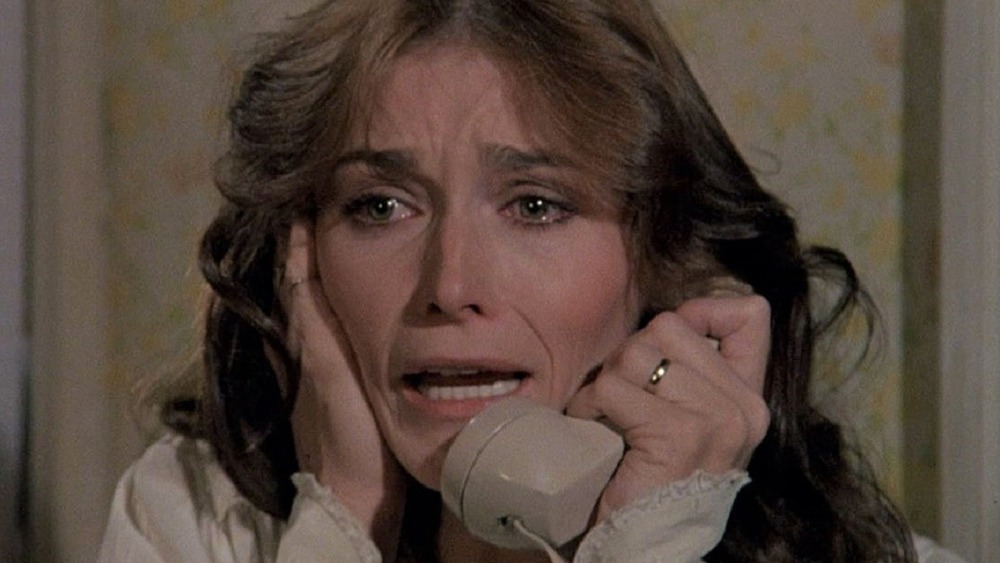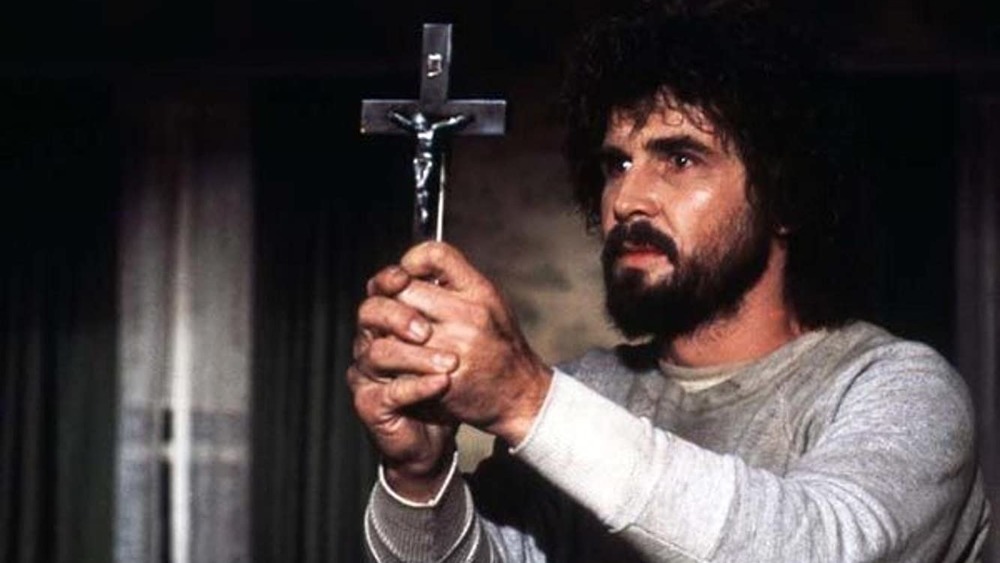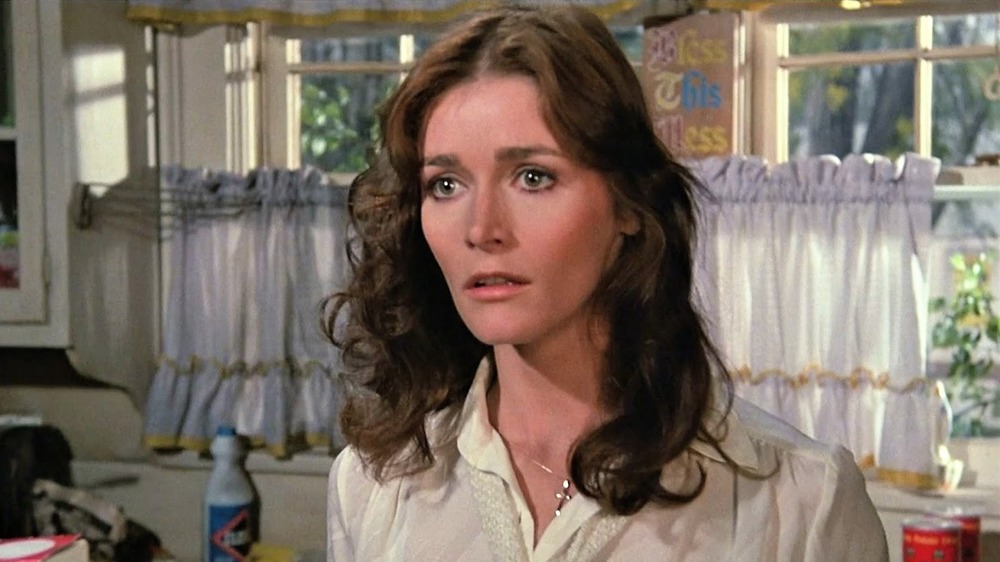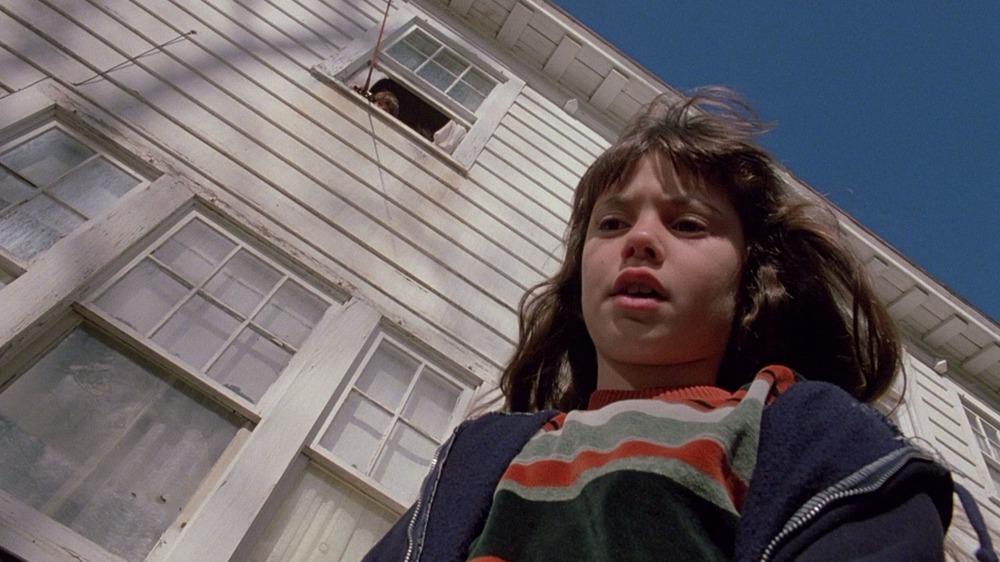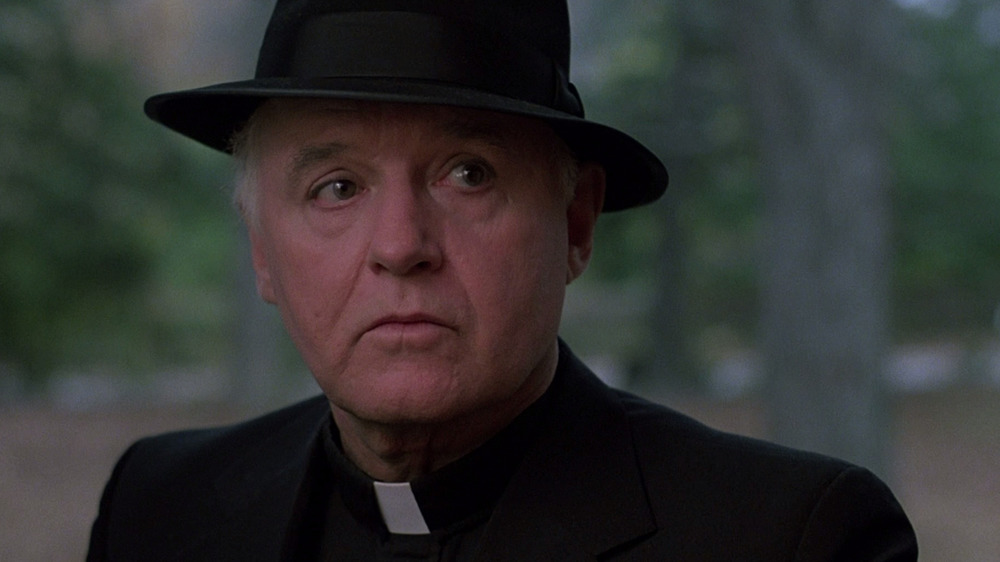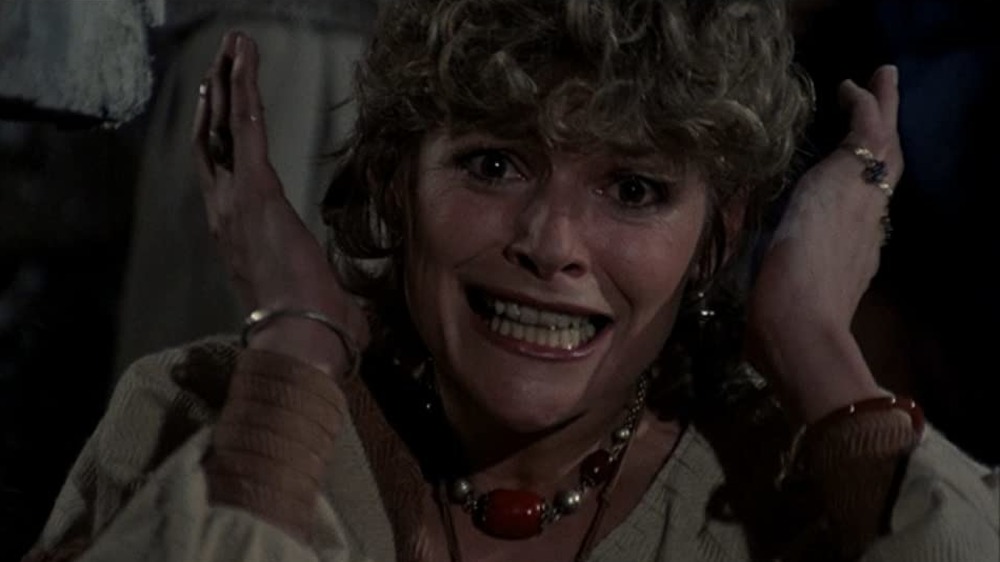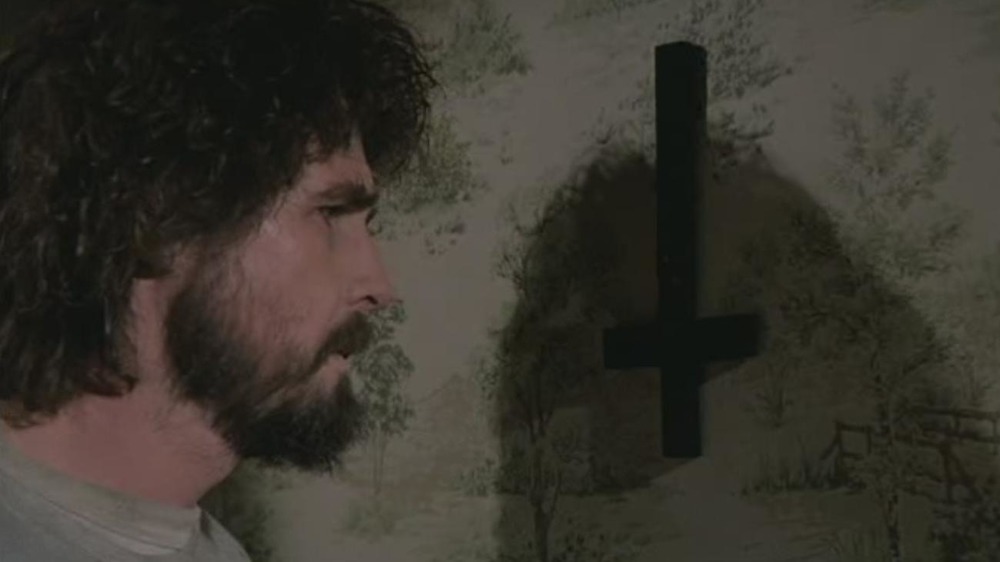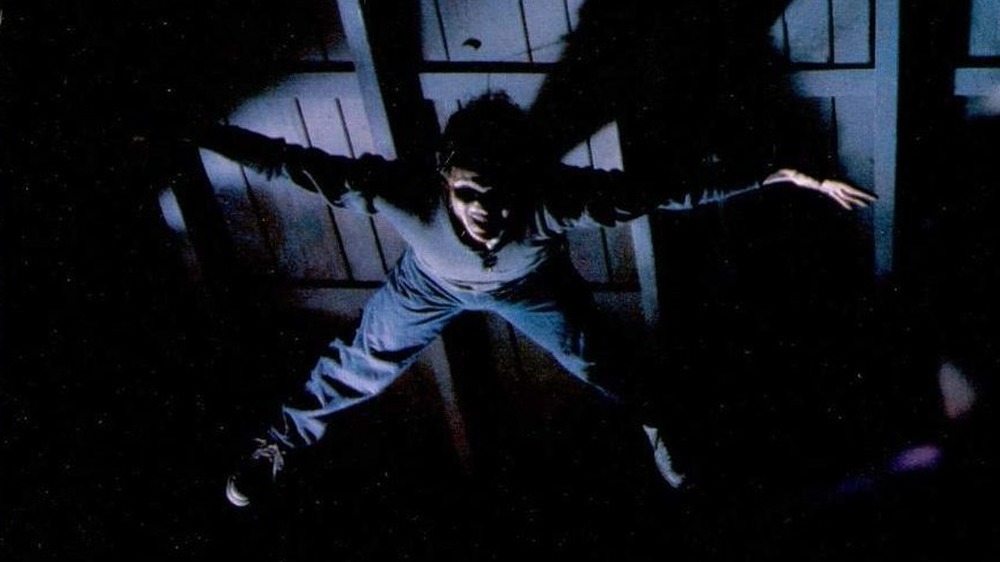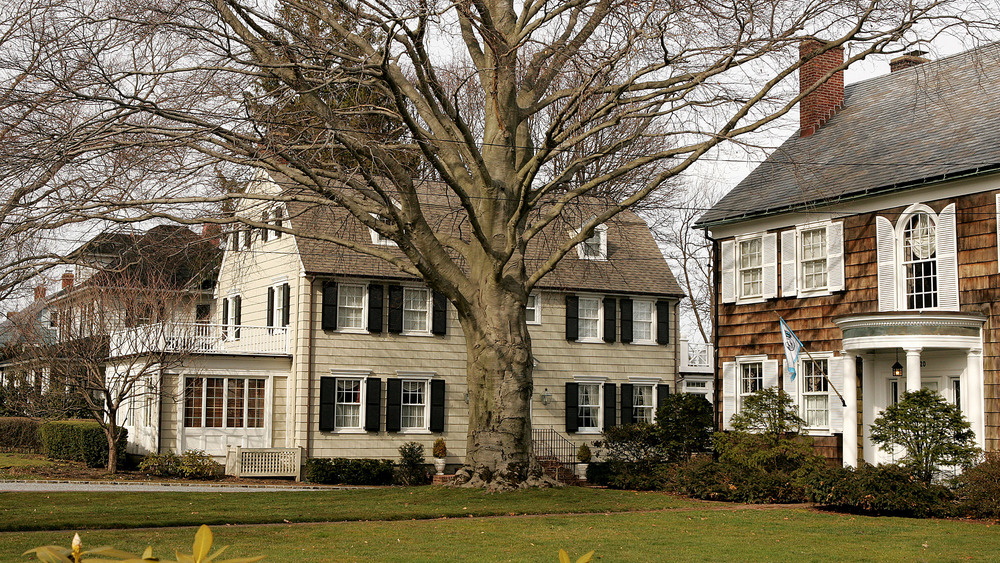The Ending Of The Amityville Horror Explained
In 1977, a few years after The Exorcist swept through American pop culture, a book hit the market that fed the public's desire for even more stories of hauntings, possessions, and dark forces on otherwise quiet streets. The book was The Amityville Horror, a stunning account of an ordinary family's encounter with evil, made all the more appealing because it was produced as a supposedly true account of the Lutz family's experiences in a Long Island home they'd just purchased.
Two years later, in 1979, the hit book became a hit film. Starring James Brolin as George Lutz and Margot Kidder as Kathy Lutz, The Amityville Horror was one of the biggest blockbusters of the year and one of the most successful horror films of the 1970s, spurred on by the story's already creep reputation and the committed work of its leads. It helped launch an entire horror franchise, and four decades later, it's still regarded as a classic haunted house movie. So, we're taking a look back at the film and, most importantly, its abrupt but haunting finale. Let's dig deep into the ending of The Amityville Horror, what it all means, and even some of the real-life impacts of the fictionalized version of the story.
What happened to George at the end of The Amityville Horror?
Every member of the Lutz family is affected, physically and emotionally, by their time in the house on Ocean Avenue, but no one is more directly altered by the experience than George Lutz. Throughout the film, we see George essentially devolve from a family man trying to make a great life for his stepchildren to an isolated grump tending his fire to an unhinged avatar of rage.
During the Lutz family's final night on Ocean Avenue, George falls prey to the home's evil influence, rampaging through his house with an axe and trying to murder his stepkids. Fortunately, he's snapped out of it by his wife, Kathy, but that's when the house begins freaking out. Windows shatter, blood oozes from the walls and staircase, and the family escapes just in time. However, George does go back for his dog, almost losing his life in the process when he falls into a pit of black slime.
George's time in the house costs him a lot, from his relationship with his business partner to his budding connection with his stepchildren to, possibly, his very sanity. The film stops short of telling us exactly what happens to George after he flees, informing us only that he left everything behind and, along with his family, moved to another state. So, we know that at least initially, he and Kathy manage to hold the family together, which suggests he's regained some semblance of the man he once was. What we don't know is just how haunted he is by the experience, and of all the members of the Lutz family, he seems the least likely to be able to fully shake the trauma away.
Kathy experienced terrible trauma during The Amityville Horror
Though her husband seems to interact much more directly with the dark presences in their new home, Kathy Lutz also endures her fair share of trauma in the Ocean Avenue house. She's present for numerous threats to her children, including a window crushing her son's hand and, of course, her daughter's persistent mentions of someone named "Jodie." And at one point, the house even physically affects her appearance, wrinkling and blistering her skin as she tries to resist its supernatural pull. Perhaps most frightening of all, though, is her understanding that her husband is slowly descending into madness and eventually violence.
The good news for Kathy is that, while her husband seems lost in the house's maelstrom, she's more proactive about searching for solutions. She does research into the background of the house, looks for clues that might explain the horrors, and she even searches for spiritual guidance that might alleviate some of it. In the end, she's also the one who manages to pull her husband back from the brink and, by extension, save her family, largely thanks to the violent dreams that plagued her and showed her the way forward.
As with George, we don't know exactly what happens to Kathy next, but it's unlikely she'll completely give up the search for answers. Even if she never visits that house again, she won't be able to let go of the darkness, if only to prevent it happening to someone else.
The Lutz children are going to need some therapy
Though we rarely see it unfolding from their point of view in the film, the Lutz children are also very much caught up in the horrors of their new home, even if they see things differently than their parents. The two boys, Matt and Greg, seem to largely experience things in bursts of terror, whether that's fear of their stepfather's wrath or fear of the house itself. Daughter Amy, however, has a much more direct connection to the house in the form of her invisible friend, a demonic pig named Jodie, who she seems to view as a benevolent playmate right up until the very end, when the final night sends the whole family into a spiral.
What's left unspoken by the end of all of this is how exactly the Lutz children will end up coping with the events in the house, if indeed they end up preserving the memory of it at all. It's possible they'll grow up to dismiss the events as some brief episode from their past, overshadowed by brighter days ahead. It's also possible they'll need quite a bit of therapy to overcome the trauma they've endured. Then, of course, there's the very specific question of Amy's connection to Jodie and whether or not leaving the house managed to sever it. That demonic pig could still be out there somewhere, waiting for its moment.
Father Delaney suffered a crisis of faith
Though the film focuses primarily on the Lutz family's story as they move into and then swiftly depart the Ocean Avenue house, The Amityville Horror also emphasizes the terror of its narrative by spending a lot of time with Father Delaney. He's the priest who arrives the day the family moves in to bless their new home and subsequently endures all manner of terrors long after he's left the property.
The physical horrors inflicted on him after leaving the Ocean Avenue house would be bad enough — illness, burns, nearly dying in a car crash — but for Father Delaney, the real terror comes later, when he tries to convince his fellow priests that something is very wrong. All of his claims, all of his calls for aid, all of his pleas for an official exorcism are denied, and he's left shouting for God's aid more directly. In response, whether through divine or demonic intervention, he's stricken blind, and by the time the movie ends, he's a shell of his former self, unable to fully answer Kathy Lutz's calls for help as he tries to recuperate.
If nothing else, though, the events at the end of the film absolutely vindicate Father Delaney. If others are finally able to see what he was trying to reveal, he may yet regain some of his faith. If not, he may be as lost as the Lutz family's idyllic vision of their home life.
Carolyn might not escape the house's evil
There's one other major figure outside of the Lutz family whose encounter with the house, while brief, makes an impact that's likely to leave a lasting impression — Carolyn, the wife of George's business partner, Jeff. As Jeff begins to notice the physical and psychological decline of his partner, his wife takes it upon herself to use her own psychic tendencies in investigating the house and the source of its potential evil. It's her prodding that eventually leads the Lutzes to discover the red room in their incredibly creepy basement, and as she looks into the strange hidden chamber, Carolyn is briefly possessed by the voice of Father Delaney, begging them to cover up "the passage to hell" beneath the home.
Carolyn doesn't have a role to play in the resolution of the story, but it's her participation in a key discovery that helps kick off the final night. And that leaves a lot of questions about her own vulnerability to the Amityville spirits. Father Delaney, after all, spent just a few minutes in the house and came away with deep physical and spiritual traumas. Could the same thing happen to Carolyn's psyche? Will she be haunted by what she experienced there in a palpable way? For her sake, we hope not.
The Church's response to the horrors of Amityville
In one of the most intense scenes in The Amityville Horror, Father Delaney attempts to confront his superiors in the Catholic Church over their refusal to treat his assessment of the Ocean Avenue house as a serious case of demonic possession. No matter how he tries to appeal to them, he's shouted down, and the case is blamed on sensationalism rather than any real supernatural danger. As a result, Father Delaney ultimately loses his sense of direction and faith, but what does the Church make of what happens next?
The film ends very abruptly, and we're told only that the Lutzes have moved to another state, leaving their belongings behind in the house. We don't know if any further investigations of the house take place, or if they do, what those investigations find. If the Lutzes are able to tell the rest of their story, as the real-life circumstances that inspired The Amityville Horror suggest, then perhaps the Church will change its tune about the house. Perhaps one day they'll be able vindicate one of their own and prove Father Delaney right.
In fiction, what happens after The Amityville Horror's ending?
Though the real George and Kathy Lutz would continue to tell the story of what happened to them after their time in the Ocean Avenue house, the Amityville films largely left the Lutzes behind after one installment in order to branch out more into fully fictional accounts of the home and its occupants.
Amityville II: The Possession functions as a bit of prequel, telling the story of the murdered family who lived on Ocean Avenue before the Lutzes. But Amityville 3-D serves as a follow-up to the first film as it tells the story of a skeptic who buys and moves into the house, only to eventually find the haunting is very, very real. In 1989, Amityville 4: The Evil Escapes expanded the series by showing what happens when a possessed object from the house is sold by a realtor and later comes to haunt the next house it arrived in.
If you want to count direct sequels along with various spinoffs and riffs, there have been over 20 films somehow connected to the "Amityville" name. That includes a 2005 remake of the original, starring Ryan Reynolds, Melissa George, and Chloe Grace Moretz, which revisits the original story of the Lutz family ... although it's hardly considered a classic.
What happened next to the actual people involved?
The Amityville Horror rocketed to success as a book and a film in part because of its depiction as a true story, an adaptation of what really happened to George and Kathy Lutz after they bought a house on Long Island that turned out to be haunted. Its eventual success as a bestseller made the couple into semi-celebrities, appearing in television interviews and becoming icons of a sort for paranormal enthusiasts searching for the truth behind famous American hauntings.
After The Amityville Horror, the Lutzes continued to tell their story in various ways, including through a sequel book — written by John G. Jones and published in 1982 — which claimed that their paranormal experiences didn't end after they left the Ocean Avenue house behind. Their continued claims about the haunting also caught the attention of various experts, from believers to skeptics, who to this day argue over whether or not the story of the haunting is true.
Sadly, George and Kathy Lutz divorced in 1988. Kathy passed away in 2004, and George followed in 2006. Kathy Lutz's sons, Daniel Lutz and Christopher Quaratino, have both maintained that the haunting was real in some form, and they blame their stepfather's fascination with the occult for causing it.
What happened to the real Amityville house?
Though the "true story" aspect of its allure (and the general creepiness of the plot) had a lot to do with The Amityville Horror's success, it's hard to ignore the impact that the house itself had on the marketing for the film series and the public consciousness tied to the story. Even now, more than 40 years after the movie was released, people can still picture that Dutch Colonial home with the deck jutting out below those strange, triangular windows on the side of the structure. After all, those eerie windows seemed to be peering out at passers-by like evil eyes.
You might imagine, after that level of infamy was bestowed on it, that the house would ultimately be a real estate nightmare and might even get torn down, but that's far from the case. The home that was formerly located at 112 Ocean Avenue in Amityville has since had its address changed to make it harder to find, and the iconic windows have been replaced. But it's still in the same spot, and it's been home to several families since the Lutzes. According to realtors who've brokered deals over the house, none of the other owners have reported any supernatural activity.
